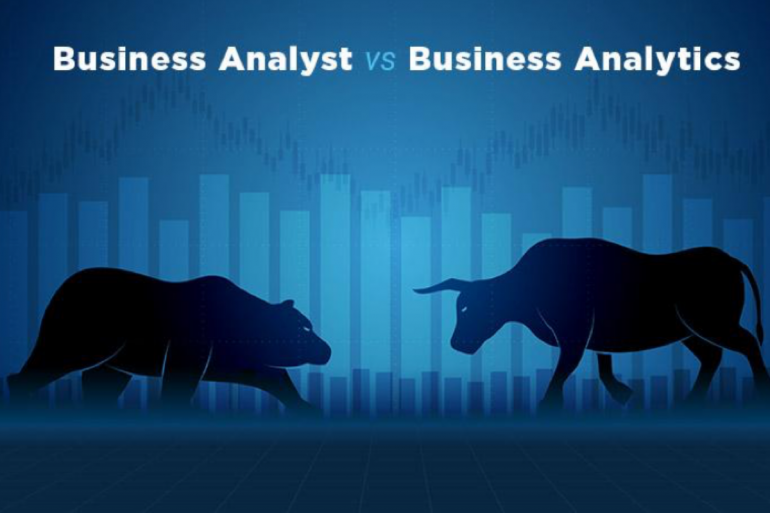
A business analyst and business analytics professional can work in the same industry, but they are different in their roles, responsibilities, skills, and career paths. All the time, people are more confused about these 2 terms.
Few start-up companies are recruiting business analysts in the position of business analytics role. Among the analytics lovers who are looking for a good career path in business analytics, this might create some confusion. To be proficient, here is the post that clearly distinguishes between a business analyst and business analytics roles.
Who is a Business Analyst?
The International Institute of Business Analysis (IIBA) defines Business Analysis as the process of defining business needs and evaluating effective solutions to business issues. A business analyst has a vital role in enhancing an enterprise toward effectiveness, efficiency, and desirability.
What is Business Analytics?
Business analytics doesn’t have a lot to do with information and is focused on functions and procedures. He/she is more concerned with data values and reporting. A business analyst, in a precise manner, uses data to make useful, careful factual decisions for an organization. The development of business analytics is on-going yet is diverted in taking care of issues and improving effectiveness utilizing a set of information-driven understanding, administrative processes, and transparent correspondence. They apply key insights from data and work on salient features of the information pipeline.
Educational Background
Business Analyst
Data Analysts should have knowledge on subjects like computer science, software engineering, programming, mathematics, and statistics. Having knowledge of these subjects, they can create and process algorithms and programs to deliver exact insight from the available raw data.
Business Analytics
Business analytics needs solid business sense on worldwide markets, activities, and the entire management. They have IT or software engineering foundations also, to empower them to utilize the data that information analysts allow. Without such a foundation, they probably won’t recognize what they were handling, so both are significant. In spite of the fact that some business analytics positions require just a four-year bachelor’s degree, a master’s degree would help them for senior positions.
Roles:
Business Analyst
A business analyst correlates the specialized team and the customer. The specialized team has the capacity to either develop and deliver a product or service. The business analyst should ensure the product delivered by the specialized team meets the present prerequisites of the customer.
A business analyst should be profoundly concerned about surveying circumstances, able to express meaningful conversations, and making the best suggestions dependent on the skills they have.
They have to concentrate vigorously on expanding the enterprise’s profits and improving their functional running costs to cut waste. It could mean recognizing redundant positions, items, affiliate marketing campaigns – or essentially whatever else.
Business Analytics
Business analytics will focus on the usage of big data tools to regulate business challenges and execute functional changes within an enterprise. Also, they need to find weaknesses in current processes and to project surface data to enhance efficiency and growth measurements of an organization.
Responsibilities
Business Analyst
The business analysts should properly communicate with all stakeholders and manage business processes effectively. Business analysts should handle data impacts on business operative decisions. They, even more, need to examine where they can make the system flow to be efficient.
Business Analytics
Business analytics works with organized data reports and applies SQL to recover information from databases. If the management needs an enterprise’s higher metrics, the individual will compose SQL queries to derive and examine the information from the database of transactions. He/she uses predictive analytics and statistics and applies logical skills to resolve business issues.
They can use advanced tools like Tableau, R, and D3.js library to communicate their program or discoveries to the end partners.
Skills
Business Analyst
- Fundamental Skills: Issue-Solving, Communication, Management, and Research abilities
- Technical Skills: Knowledge on IT, Software development and Domain
- Business Skills: Document Analysis and creative skills
Business Analytics
- Analytical Skills: Logical thinking, Data predictions
- Capability Skills: Understandable, Visualization, Clear Communication skills
- Programming Skills: SQL, Python, Julia, Hadoop and so on
Certification Courses:
Business Analyst
There are plenty of certifications to become business analysts and numerous organizations providing courses and exams to certify your business analytics skills. For a list of business analyst certification, check out these seven noteworthy certifications.
- Entry Certificate in Business Analysis (ECBA) – It is for executives who are new to the data field.
- Certification of Capability in Business Analysis (CCBA) – It is for business analysis professionals having experience of 2-3 years
- Certified Business Analysis Professional (CBAP) – Suitable for BA candidates having work experience of 5+ years
- Certified Business Analysis Thought Leader (CBATL) – It is for candidates who have BA degree and over 10+ years of experience
Business Analytics
Some Universities offer an online certificate program, which is a relatively shorter way to gain specialization in a data field. Here are some famous certification course programs to look into:
- The Harvard Business Analytics Program – Harvard provides a 9-month certificate program for executives and trains with the data and analytics skill set to drive the industry.
- American University Master of Science in Analytics – This 1-year program is designed for professionals who plan to earn expertise in data analysis and get knowledge on new insights in their sector.
Career Options:
Business Analyst
If you wish to go for alternative careers with the current experience, below are five various career paths mentioned based on education and skills.
- Financial Analyst
- Computer Systems Analyst
- Market Research Analyst
- Postsecondary Business Teacher
- Actuary
Business Analytics
If you wish to specialize in your streams, here are some roles for an individual to choose from:
- Business Analyst Roles – Data Architect, Data Scientist, and Data Analyst
- Operations Research Analyst Roles – Business Operations Analyst, Operations Analyst, Operations Business Analyst
- Market Research Analyst
- Quantitative Analyst Roles – Quantitative Modeler, Financial Analyst
Bottom Line:
Analysts make the organization run better, and to do as such, they need data. It is clear with the above information that both business analyst and business analytics roles are key roles for effective business operations. Finally, they both work closely to deliver the final project successfully. To conclude, hopefully, you feel comfortable to plan a wise decision about which job suits and works best for you.
Best regards,
Marketing Fundamentals Team
This is blog post number 553
Follow us on Social Media





